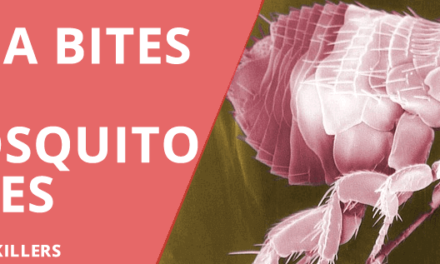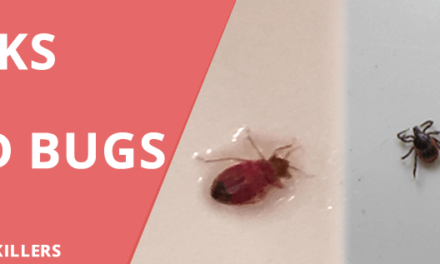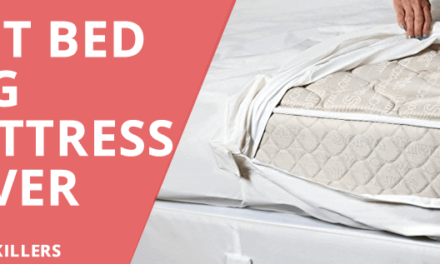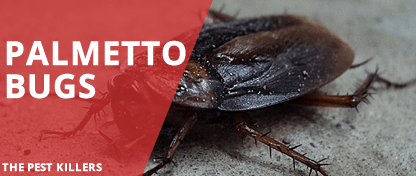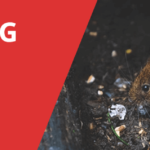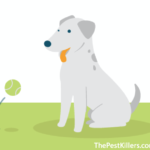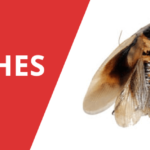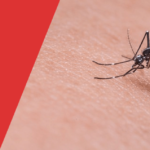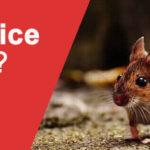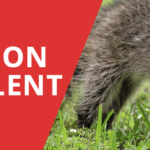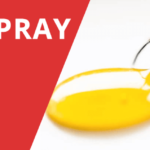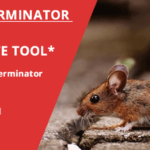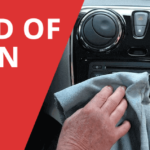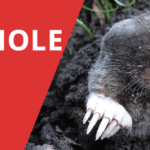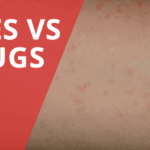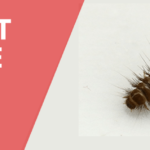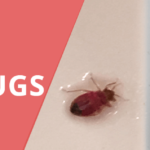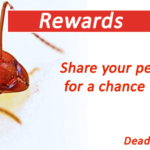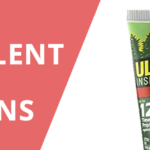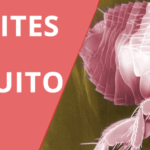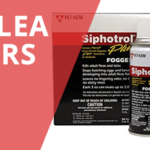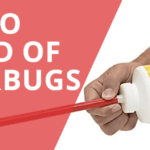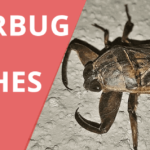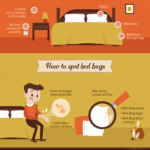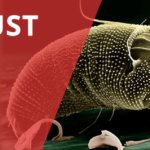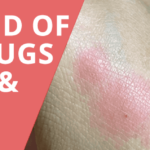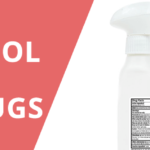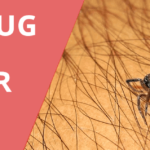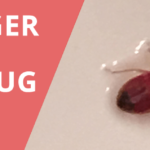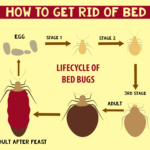What is the best wasp spray for getting rid of wasp?
The last thing you want to hear is the violent war cries of a wasp colony hanging from the side of your home.
If you thought bee stings were painful, then you should know what wasp stings are even more agonizing. In fact, wasps tend to sting multiple times and keep coming at you. However, you don’t need to fear these insects. With the best wasp spray at your disposal, you can counter them easily.
| Product | Spray Range | Price |
| Spectracide Wasp & Hornet Killer | 27 feet | |
| SpectracidePRO Wasp & Hornet Killer | 20 feet | |
| Ortho Home Defense Hornet & Wasp Killer | 20 feet | |
| Enforcer EWHIK16 Instant Knockdown Wasp | 22 feet |
What are wasps?
 Up till now, there have been over 30,000 identified species of wasps, and all of them have been categorized into two: social or solitary wasps. Most of the wasp species are solitary, and as the name suggests, they operate and live alone.
Up till now, there have been over 30,000 identified species of wasps, and all of them have been categorized into two: social or solitary wasps. Most of the wasp species are solitary, and as the name suggests, they operate and live alone.
Examples of such examples include parasitic wasps that are beneficial insects and are used for agricultural pest control. Meanwhile, hunting wasps hunt insects like spiders.
Only about 1,000 species of wasps have been identified as social wasps, and these are the ones encountered by people the most. Social wasps include umbrella wasps, yellow jackets, umbrella wasps, and hornets. These tend to live in colonies and work together.
The body of a wasp is divided into three segments; lower abdomen, thorax, and the head. Paper wasps or umbrella wasps have thin bodies measuring 0.75 to 1 inch in length with black wings. Meanwhile, the color of the body ranges from reddish-brown to brown, depending on the wasp species.
Wasps are found in numerous places including suburban and urban settings, playgrounds, meadows, cemeteries, orchards, cemeteries, and woodlands. While all wasps build nests, their nesting preferences differ.
Generally, the habitat of a wasp is a paper-like nest made using wood fibers chewed into a pulp. They usually build large nests in trees and in manmade structures too like house walls, attics, porch overhangs, and decks.
Best Wasp Sprays Product Reviews
With the best wasp spray available at hand, you can quickly get rid of the wasps without undergoing the agonizing pain of their wasp stings. The following are eight best wasp sprays that are worth buying.
1. Spectracide Wasp & Hornet Killer
 This wasp killer is an aerosol spray that not only helps to eliminate hornet and wasps by ensuring killing on contact, but can also help with many other insects like caterpillars, scorpions, and ants. The active ingredients of this wasp spray include prallethrin and lambda-cyhalothrin. With a jet spray of 27 feet, you can spray the nests from afar to not risk being stung. All in all, it is a non-staining spray, designed for outdoor use against stinging hornets and wasps.
This wasp killer is an aerosol spray that not only helps to eliminate hornet and wasps by ensuring killing on contact, but can also help with many other insects like caterpillars, scorpions, and ants. The active ingredients of this wasp spray include prallethrin and lambda-cyhalothrin. With a jet spray of 27 feet, you can spray the nests from afar to not risk being stung. All in all, it is a non-staining spray, designed for outdoor use against stinging hornets and wasps.
• It is a pretty cheap option
• Helps to get rid of the nests
• Can be messy as it tends to foam
2. SpectracidePRO Wasp & Hornet Killer
 The SpectracidePRO aerosol spray is not only effective for killing wasps and hornets; it can also get rid of yellow jackets. Plus, it can eliminate their nests too. This wasp spray is an effective solution for dangerous stinging insects as the jet spray reaches up to 20 ft. away, thus allowing you to spray from a safe distance. Apart from killing the whole nest, the spray also kills returning insects for up to a month. Moreover, it has a dielectric voltage of about 47,000V which means it can be safely used near electric panels. Active ingredients include tetramethrin, permethrin, and piperonyl butoxide.
The SpectracidePRO aerosol spray is not only effective for killing wasps and hornets; it can also get rid of yellow jackets. Plus, it can eliminate their nests too. This wasp spray is an effective solution for dangerous stinging insects as the jet spray reaches up to 20 ft. away, thus allowing you to spray from a safe distance. Apart from killing the whole nest, the spray also kills returning insects for up to a month. Moreover, it has a dielectric voltage of about 47,000V which means it can be safely used near electric panels. Active ingredients include tetramethrin, permethrin, and piperonyl butoxide.
• Kills right on contact
• It is an inexpensive spray
• Jet spray distance is less than 20 ft.
3. Ortho Home Defense Hornet & Wasp Killer
 The Ortho wasp spray kills wasps along with hornets, yellow jackets, and mud daubers. The active ingredients present in this spray include tetramethrin and sumithrin. The spray has an entrapping foam which stops the wasp instantly while the jet spray reaches up to 20 ft. Above ground so that you can stand away from the nest. The foam is also pinpoint accurate which means it can reach around window frames, carports, and doorways. Apart from killing the insects, it also kills the insects that return to the nest later.
The Ortho wasp spray kills wasps along with hornets, yellow jackets, and mud daubers. The active ingredients present in this spray include tetramethrin and sumithrin. The spray has an entrapping foam which stops the wasp instantly while the jet spray reaches up to 20 ft. Above ground so that you can stand away from the nest. The foam is also pinpoint accurate which means it can reach around window frames, carports, and doorways. Apart from killing the insects, it also kills the insects that return to the nest later.
- The deadly solution works effectively
- Foams up, thus killing on contact
- Prevents insect from leaving the nest as they are trapped
• Not useful for yellow jackets’ underground hives
4. Enforcer EWHIK16 Instant Knockdown Wasp
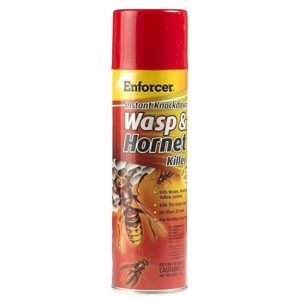 The Enforcer wasp spray has an instant knockdown formula which kills the entire nest of not only wasps but also hornets and yellow jackets too. With active ingredients like piperonyl butoxide, permethrin, and tetramethrin, the Enforcer is an effective spray.
The Enforcer wasp spray has an instant knockdown formula which kills the entire nest of not only wasps but also hornets and yellow jackets too. With active ingredients like piperonyl butoxide, permethrin, and tetramethrin, the Enforcer is an effective spray.
Moreover, the jet spray can blast up the formula for 22 feet, letting you spray from a safe distance. Plus, it is non-conductive to up 47,300 volts which means it can be used near electrical panels. Furthermore, the residual action kills returning insects.
• Kills entire nest
• Blasts up to 22 feet
5. EcoSMART Organic Wasp and Hornet Killer
 If you are fed up with yellow jackets, spiders, wasps, and hornets in your garden, the EcoSMART Organic wasp spray is the best way to get rid of them. The spray effectively kills insects while keeping your family away from harmful chemicals. Ingredients present in this spray include peppermint oil and potent plant oils thus eliminating overbearing chemical smells. With a spraying distance of 18 feet, you can spray wasps from afar, reducing the chances of getting stung. It is a non-toxic, environment-friendly wasp spray.
If you are fed up with yellow jackets, spiders, wasps, and hornets in your garden, the EcoSMART Organic wasp spray is the best way to get rid of them. The spray effectively kills insects while keeping your family away from harmful chemicals. Ingredients present in this spray include peppermint oil and potent plant oils thus eliminating overbearing chemical smells. With a spraying distance of 18 feet, you can spray wasps from afar, reducing the chances of getting stung. It is a non-toxic, environment-friendly wasp spray.
• Prevents insects from returning
• Kills instantly
• Spray nozzle does not reach the advertised length
6. Wasp & Hornet Killer Plus
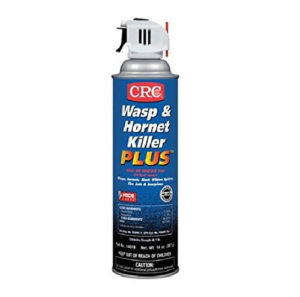 The next spray on this list of best wasp sprays is the wasp and hornet killer by CRC. It is a fast acting and high strength insecticide. It comes with an ergonomic trigger which not only provides good control but also works with gloved hands. The trigger also provides an accurate and dense spray stream that reaches more than 20 feet and drenches the insects along with the nests. The active ingredients in this spray include tetramethrin and permethrin.
The next spray on this list of best wasp sprays is the wasp and hornet killer by CRC. It is a fast acting and high strength insecticide. It comes with an ergonomic trigger which not only provides good control but also works with gloved hands. The trigger also provides an accurate and dense spray stream that reaches more than 20 feet and drenches the insects along with the nests. The active ingredients in this spray include tetramethrin and permethrin.
• Can be easily sprayed from 15 to 20 feet away
• Available at a good price range
7. Wondercide Natural Outdoor Pest Control Spray
 The Wondercide wasp control spray can efficiently kill as well as repel hundreds of various bugs like palmetto bugs, mosquitoes, ticks, mites, chiggers, fleas, mole crickets, roaches, silverfish, etc. It is made using only human food-grade and organic ingredients like cedar oil, thus allowing completely non-toxic and biodegradable pest control. Since it can treat the lifecycle of the insect, it can kill the egg, pupae, larvae, and adult too. The spray doesn’t have a jet spray; just attach the opening to the hose and spray.
The Wondercide wasp control spray can efficiently kill as well as repel hundreds of various bugs like palmetto bugs, mosquitoes, ticks, mites, chiggers, fleas, mole crickets, roaches, silverfish, etc. It is made using only human food-grade and organic ingredients like cedar oil, thus allowing completely non-toxic and biodegradable pest control. Since it can treat the lifecycle of the insect, it can kill the egg, pupae, larvae, and adult too. The spray doesn’t have a jet spray; just attach the opening to the hose and spray.
• Has a wonderful smell
• Environment-friendly
• Since you need to spray a good amount, you run out of this spray quickly
8. Wasp-X Wasp & Hornet Spray
 The last spray on our list of best wasp sprays is the Wasp-X aerosol which not only kills the insects on contact but also continues to kill the insects with its foaming action. Thus, the residual activity of the spray helps eliminate the nest too. Active ingredients of the spray include piperonyl butoxide, tetramethrin, and etofenprox. Moreover, the jet spray can reach nests that are up to 20 feet away. Moreover, the spray has a water-based formula which is easy on the plants and reduces staining as well.
The last spray on our list of best wasp sprays is the Wasp-X aerosol which not only kills the insects on contact but also continues to kill the insects with its foaming action. Thus, the residual activity of the spray helps eliminate the nest too. Active ingredients of the spray include piperonyl butoxide, tetramethrin, and etofenprox. Moreover, the jet spray can reach nests that are up to 20 feet away. Moreover, the spray has a water-based formula which is easy on the plants and reduces staining as well.
- Effective for yellow jackets and hornets too
- Kills instantly
- The water-based formula helps avoid staining
Best Wasp Spray Buying Guide
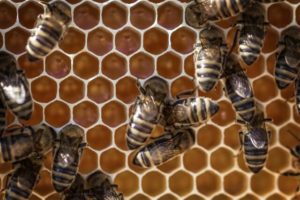 Now that we have reviewed the best wasp sprays there are, the next step is to help you decide how to choose a wasp spray. There are certain factors that you must keep an eye out for before purchasing one.
Now that we have reviewed the best wasp sprays there are, the next step is to help you decide how to choose a wasp spray. There are certain factors that you must keep an eye out for before purchasing one.
Spray range
Anyone with an extreme disliking to wasps would want to stay away from the bugs as much as possible when trying to get rid of them. The average range for most wasp sprays is roughly around 20 feet to 25 feet, but there are some higher class sprays that offer a spray range of up to 27 feet. Wasps are territorial insects, and once they suspect that their colony might be in danger, they swarm to eliminate the threat. Thus, it is better to have as much distance from the nest as possible.
Effectiveness
Perhaps, the most effective wasp spray you can buy is one which leaves the wasp’s net uninhabitable. Such a spray will contain a mixture of active ingredients that instantly kill the insect. At the same time, an ideal spray should also contain oils that can bind the ingredients to the nest and insects, thus allowing residual action. Moreover, an effective spray should also get rid of the larva in the nest and also poison the nest so that insects returning can also be killed shortly.
Cost
While wasp sprays are generally not too expensive, you must ensure that the one you purchase is worth the price. Have a look at the spraying distance as well as the active ingredients in the spray and the insects it can get rid of to ensure it is worth the price.
Active ingredients
The active ingredients of a wasp spray are important for many reasons. Essentially, it determines the effectiveness of the spray in getting rid of the wasps. It also helps to determine whether the active ingredients are harmful to humans, pets, or the environment too. For instance, some ingredients are carcinogenic, and it is best to avoid such a spray if you are going to be using it around your house. One effective ingredient that is best to have in a spray is pyrethrin as it is known to know down the wasps quickly.
Wasp vs. Hornets
 Both hornets and wasps are from the Vespidae family. Till now, there have been more than 100,000 identified wasp species with hornet being a subspecies of wasps. However, there are few differences between them, and these are as follows:
Both hornets and wasps are from the Vespidae family. Till now, there have been more than 100,000 identified wasp species with hornet being a subspecies of wasps. However, there are few differences between them, and these are as follows:
Appearance
Hornets are basically large wasps with species going up to 5.5 cm in length. Hornets can be differentiated by other wasps with their larger and rounded abdomens and wider heads.
Wasps, however, greatly vary in appearance, depending on the species. While some species have two sets of wings, some are wingless. The common appearance of all wasps is along and slender body, extremely thin waist between the abdomen and thorax, a stinger, and drooping legs during flight.
Lifecycle
All hornets are known as social insects which means there is a hierarchy, they make a nest, and live in a colony. Meanwhile, lifecycles, nesting habits, and hierarchical structures of wasps vary across the species.
Eating habits
Adult hornets mostly eat plant matter and have a tendency for sweet items like sugary processed foods, sap, nectar, and rotten fruits. They prey on other insects too and feed them to their larvae.
Meanwhile, adult wasps are predatory, and scavengers and only survive on nectar.
Sting
Hornets make use of their stings to kill their prey and defend the nests. Hornets can sting multiple times and are more painful for humans as compared to stings of other wasp species.
In wasps, the stinger is only present on the females. Certain wasp species are considered to be the most aggressive of the stinging insects like yellow jackets.
Most Common Wasp & Hornet Hiding Places
 Most Common Wasp & Hornet Hiding Places
Most Common Wasp & Hornet Hiding Places
Since wasps are quite small, they have no problems in fitting between holes and small cracks. For this reason, you’ll find that wasps have built their nest in places hidden from human threat. Following are some places you are most likely to find hornets and wasps hidden along with their nests:
- Under the roof: Since wasps have adapted to human advancements, you will find them in the cracks and holes in your roof
- Hanging from tree branches: Just like bees, wasps and hornets can make a nest hanging from the branches
- Tree trunks: Wasps can build their nests under the tree’s bark or in a hole in the tree
Underground: Some species of wasps like yellow jacket wasp build their nest under the ground
DIY wasp sprays
Sometimes, wasp insecticides you get your hands on isn’t too effective while others have undesirable effects on individuals particularly if they are sensitive or allergic to certain chemicals. In such a case, you can make a DIY spray using dish soap and water.
First, fill up a spray bottle with water; either hot or cold, the temperature doesn’t matter. Then, add a quarter of the dish soap detergent and shake the bottle well. Then spray it on the wasps. Dish soap tends to clog the exoskeleton pores of wasps, resulting in wasps drowning. You can see how effective this DIY spray is here.
Safety of Using a Wasp Spray
When using a wasp spray, you need to keep the following safety factors in mind:
- Since wasps have sleeping patterns similar to that of humans, it is better to spray after it is dark as the wasps are comparatively less aggressive during this time.
- When using a torch for better visibility at night, try not to illuminate the nest directly. Instead, place the torch down and have it facing the opposite direction. Otherwise, wasps can get agitated and attack you.
- Wasps can be a serious threat, and you need to be dressed appropriately for getting rid of them.
- Wear such protective clothing which covers you completely so that there is no space for the wasp to sting.
- Wear a protective face mask too so that not only you stay safe from the wasps, but so that you also stay safe from the side effects these sprays have.
Wasp prevention
 Apart from purchasing the best wasp spray, you also need to take measures for prevention.
Apart from purchasing the best wasp spray, you also need to take measures for prevention.
Beware of wasp nests
Wasps usually start making their nests in early summers or late spring. Try surveying your home particularly taking care of potential nest-building areas like play equipment, awnings, small corners, and overhangs. Even if you don’t see any nests, you should swab potential areas with oils like citronella and mint to decrease the chances of a nest built there.
Keep trash secure
Wasps tend to feed on compost which includes the food waste that you throw out. Trash is what attracts them to your house. Thus, you should ensure that you dispose of the trash and keep them in bins securely at a place where wasps can’t find them. Make sure to store the bins away from the entrance and keep the windows closed otherwise wasps can crawl inside.
Call an exterminator
If the infestation gets too extreme, it is time to call an exterminator to get rid of the wasps permanently.


